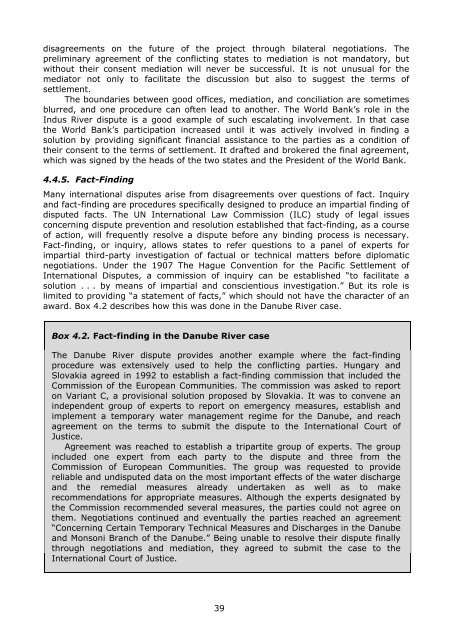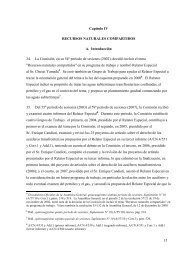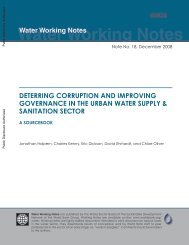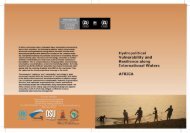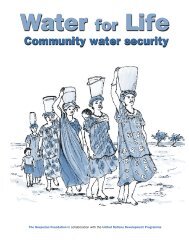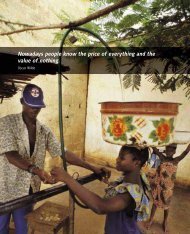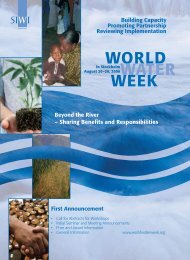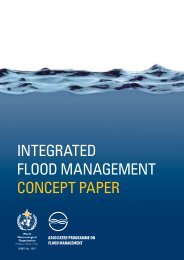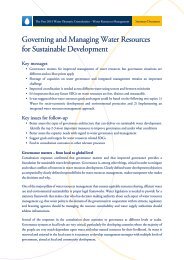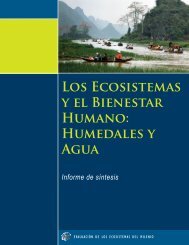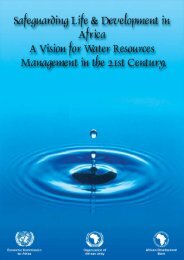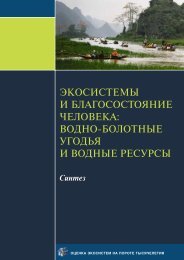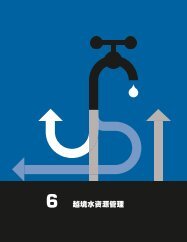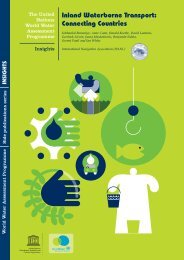Water security and peace: a synthesis of studies ... - unesdoc - Unesco
Water security and peace: a synthesis of studies ... - unesdoc - Unesco
Water security and peace: a synthesis of studies ... - unesdoc - Unesco
You also want an ePaper? Increase the reach of your titles
YUMPU automatically turns print PDFs into web optimized ePapers that Google loves.
disagreements on the future <strong>of</strong> the project through bilateral negotiations. The<br />
preliminary agreement <strong>of</strong> the conflicting states to mediation is not m<strong>and</strong>atory, but<br />
without their consent mediation will never be successful. It is not unusual for the<br />
mediator not only to facilitate the discussion but also to suggest the terms <strong>of</strong><br />
settlement.<br />
The boundaries between good <strong>of</strong>fices, mediation, <strong>and</strong> conciliation are sometimes<br />
blurred, <strong>and</strong> one procedure can <strong>of</strong>ten lead to another. The World Bank’s role in the<br />
Indus River dispute is a good example <strong>of</strong> such escalating involvement. In that case<br />
the World Bank’s participation increased until it was actively involved in finding a<br />
solution by providing significant financial assistance to the parties as a condition <strong>of</strong><br />
their consent to the terms <strong>of</strong> settlement. It drafted <strong>and</strong> brokered the final agreement,<br />
which was signed by the heads <strong>of</strong> the two states <strong>and</strong> the President <strong>of</strong> the World Bank.<br />
4.4.5. Fact-Finding<br />
Many international disputes arise from disagreements over questions <strong>of</strong> fact. Inquiry<br />
<strong>and</strong> fact-finding are procedures specifically designed to produce an impartial finding <strong>of</strong><br />
disputed facts. The UN International Law Commission (ILC) study <strong>of</strong> legal issues<br />
concerning dispute prevention <strong>and</strong> resolution established that fact-finding, as a course<br />
<strong>of</strong> action, will frequently resolve a dispute before any binding process is necessary.<br />
Fact-finding, or inquiry, allows states to refer questions to a panel <strong>of</strong> experts for<br />
impartial third-party investigation <strong>of</strong> factual or technical matters before diplomatic<br />
negotiations. Under the 1907 The Hague Convention for the Pacific Settlement <strong>of</strong><br />
International Disputes, a commission <strong>of</strong> inquiry can be established “to facilitate a<br />
solution . . . by means <strong>of</strong> impartial <strong>and</strong> conscientious investigation.” But its role is<br />
limited to providing “a statement <strong>of</strong> facts,” which should not have the character <strong>of</strong> an<br />
award. Box 4.2 describes how this was done in the Danube River case.<br />
Box 4.2. Fact-finding in the Danube River case<br />
The Danube River dispute provides another example where the fact-finding<br />
procedure was extensively used to help the conflicting parties. Hungary <strong>and</strong><br />
Slovakia agreed in 1992 to establish a fact-finding commission that included the<br />
Commission <strong>of</strong> the European Communities. The commission was asked to report<br />
on Variant C, a provisional solution proposed by Slovakia. It was to convene an<br />
independent group <strong>of</strong> experts to report on emergency measures, establish <strong>and</strong><br />
implement a temporary water management regime for the Danube, <strong>and</strong> reach<br />
agreement on the terms to submit the dispute to the International Court <strong>of</strong><br />
Justice.<br />
Agreement was reached to establish a tripartite group <strong>of</strong> experts. The group<br />
included one expert from each party to the dispute <strong>and</strong> three from the<br />
Commission <strong>of</strong> European Communities. The group was requested to provide<br />
reliable <strong>and</strong> undisputed data on the most important effects <strong>of</strong> the water discharge<br />
<strong>and</strong> the remedial measures already undertaken as well as to make<br />
recommendations for appropriate measures. Although the experts designated by<br />
the Commission recommended several measures, the parties could not agree on<br />
them. Negotiations continued <strong>and</strong> eventually the parties reached an agreement<br />
“Concerning Certain Temporary Technical Measures <strong>and</strong> Discharges in the Danube<br />
<strong>and</strong> Monsoni Branch <strong>of</strong> the Danube.” Being unable to resolve their dispute finally<br />
through negotiations <strong>and</strong> mediation, they agreed to submit the case to the<br />
International Court <strong>of</strong> Justice.<br />
39


